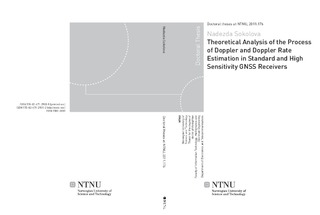Theoretical Analysis of the Processof Doppler and Doppler Rate Estimation in Standard and High Sensitivity GNSS Receivers
Doctoral thesis
Permanent lenke
http://hdl.handle.net/11250/2370338Utgivelsesdato
2011Metadata
Vis full innførselSamlinger
Sammendrag
Due to the capability of the Global Positioning System (GPS) to provide accurate, stablelong-term navigation information, the use of a GPS receiver as a velocity and accelerationsensor has gained an increasing research interest. Navigation and control, airbornegravimetry and integration with inertial navigation systems (INS) are just some of thepotential applications.
GPS velocity and acceleration measurements are typically determined using Doppler and Doppler rate observations provided by the receiver carrier tracking loops. Thus, the finalquality of the velocity/acceleration measurements depends on the variance of the Dopplerand Doppler rate observations and on the approach used for the velocity/accelerationcomputation. It is therefore desirable to be able to predict the quality of Doppler andDoppler rate observations, not only for quality control and for estimating the uncertainty ofthis information, but also for properly weighting the measurements in the LS and KFsolution.
This thesis introduces a cohesive analysis describing the noise propagation process from theinput of the carrier tracking loops to the final Doppler and Doppler rate estimates. Two different approaches used by GNSS receivers are considered namely the sequential carriertracking, including the standard and memory discriminator based approaches, and blockprocessing techniques. For each approach, a theoretical framework for Doppler estimationrelating the variance and biases of the Doppler estimates to C/N0, the user dynamics and thealgorithm parameters is introduced.
Also, based on the proposed theoretical framework a new approach to loop filter designproviding control over the noise variance of the Doppler measurements is introduced.The developed theoretical framework and the proposed approach to loop filter design havebeen verified by performing a number of static and dynamic pedestrian-based field testsand simulations with the major focus on the environments with strong signal attenuationand multipath.
